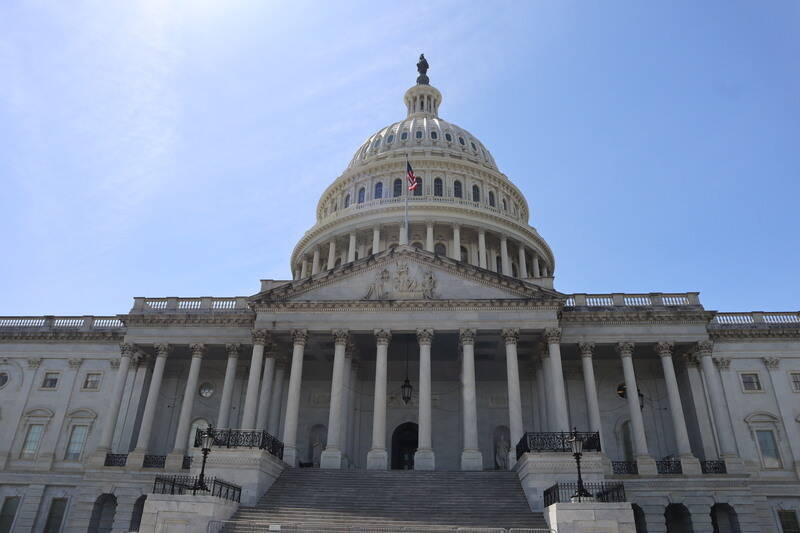The Presidential Office yesterday thanked the US House of Representatives for unanimously passing two Taiwan-related bills highlighting its solid support for Taiwan’s democracy and global participation, and for deepening bilateral relations.
One of the bills, the Taiwan Assurance Implementation Act, requires the US Department of State to periodically review its guidelines for engagement with Taiwan, and report to the US Congress on the guidelines and plans to lift self-imposed limitations on US-Taiwan engagement.
The other bill is the Taiwan International Solidarity Act, which clarifies that UN Resolution 2758 does not address the issue of the representation of Taiwan or its people in the UN or related organizations.

Photo: Yasuyoshi Chiba, AFP
Taiwan thanks the US House of Representatives’ long-term bipartisan support for the nation and for passing the two bills, Presidential Office spokesperson Karen Kuo (郭雅慧) said.
“Steadfast support from the US Congress sends a clear message against China’s misuse of UN Resolution 2758 to limit Taiwan’s international space,” she said.
The passage of the bills highlights international society’s correct understanding of the original meaning of UN Resolution 2758, she said, adding that it shows the US’ firm support for Taiwan’s democratic value and international participation, as well as its proactive actions to deepen Taiwan-US relations.

Photo: CNA
Minister of Foreign Affairs Lin Chia-lung (林佳龍) said the two bills show that Taiwan and the US share the same core values of freedom and democracy, and highlight the two countries’ firm commitment to continue deepening their partnership.
“The passage of the two acts is especially meaningful to Taiwan,” he wrote on Facebook, adding that Taiwan would not only remember this friendship and trust, but would continue to cooperate with the US and other like-minded countries to responsibly contribute to regional and global peace and stability.
Ministry of Foreign Affairs spokesperson Hsiao Kuang-wei (蕭光偉) added that Taiwan, a responsible member of the international society, would continue to work closely with the US and other like-minded countries, deepening comprehensive partnerships, and together address various global challenges.
The Taiwan International Solidarity Act aims to counter China’s malicious attempt to distort UN Resolution 2758 and obstruct Taiwan’s participation in international organizations, he said.
The act also emphasized that the resolution only established China’s representation in the UN, but made no mention of Taiwan, he added.
“China continues to deliberately extend its misuse of UN Resolution 2758 to suppress Taiwan’s participation in international organizations and block Taiwan’s contributions,” Hsiao said.
Beijing also uses a false “one China principle” to claim that the resolution establishes its sovereignty over Taiwan, he said.
The act demonstrates the US House of Representatives’ concrete action — clarifying the fact through legislation — to counter China’s deliberate distortion of UN Resolution 2758 in the international realm, Hsiao said.

A Ministry of Foreign Affairs official yesterday said that a delegation that visited China for an APEC meeting did not receive any kind of treatment that downgraded Taiwan’s sovereignty. Department of International Organizations Director-General Jonathan Sun (孫儉元) said that he and a group of ministry officials visited Shenzhen, China, to attend the APEC Informal Senior Officials’ Meeting last month. The trip went “smoothly and safely” for all Taiwanese delegates, as the Chinese side arranged the trip in accordance with long-standing practices, Sun said at the ministry’s weekly briefing. The Taiwanese group did not encounter any political suppression, he said. Sun made the remarks when

The Taiwanese passport ranked 33rd in a global listing of passports by convenience this month, rising three places from last month’s ranking, but matching its position in January last year. The Henley Passport Index, an international ranking of passports by the number of designations its holder can travel to without a visa, showed that the Taiwan passport enables holders to travel to 139 countries and territories without a visa. Singapore’s passport was ranked the most powerful with visa-free access to 192 destinations out of 227, according to the index published on Tuesday by UK-based migration investment consultancy firm Henley and Partners. Japan’s and

BROAD AGREEMENT: The two are nearing a trade deal to reduce Taiwan’s tariff to 15% and a commitment for TSMC to build five more fabs, a ‘New York Times’ report said Taiwan and the US have reached a broad consensus on a trade deal, the Executive Yuan’s Office of Trade Negotiations said yesterday, after a report said that Washington is set to reduce Taiwan’s tariff rate to 15 percent. The New York Times on Monday reported that the two nations are nearing a trade deal to reduce Taiwan’s tariff rate to 15 percent and commit Taiwan Semiconductor Manufacturing Co (TSMC, 台積電) to building at least five more facilities in the US. “The agreement, which has been under negotiation for months, is being legally scrubbed and could be announced this month,” the paper said,

MIXED SOURCING: While Taiwan is expanding domestic production, it also sources munitions overseas, as some, like M855 rounds, are cheaper than locally made ones Taiwan and the US plan to jointly produce 155mm artillery shells, as the munition is in high demand due to the Ukraine-Russia war and should be useful in Taiwan’s self-defense, Armaments Bureau Director-General Lieutenant General Lin Wen-hsiang (林文祥) told lawmakers in Taipei yesterday. Lin was responding to questions about Taiwan’s partnership with allies in producing munitions at a meeting of the legislature’s Foreign Affairs and National Defense Committee. Given the intense demand for 155mm artillery shells in Ukraine’s defense against the Russian invasion, and in light of Taiwan’s own defensive needs, Taipei and Washington plan to jointly produce 155mm shells, said Lin,